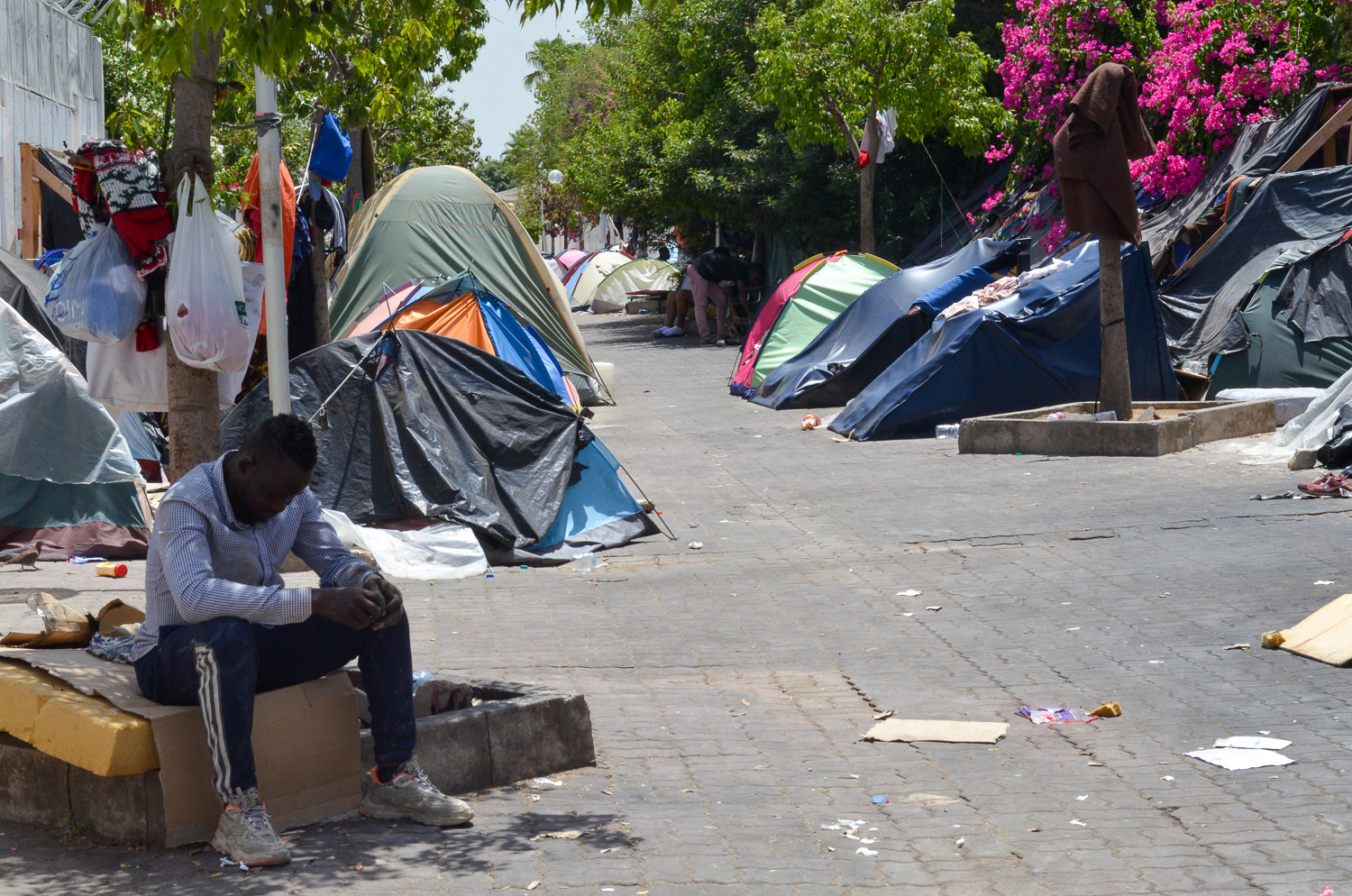
Tunis, Tunisia – The makeshift camp outside the offices of the International Organization for Migration (IOM) was practically deserted. Empty tents lay scattershot on the burning pavement, as the blistering sun beat down.
“We cannot endure this,” said Kelly, one of the 100 or so irregular migrants and refugees sleeping outside the IOM building. “We don’t feel rested. Every day we are stressed.”
The temperature in Tunis reached 50 degrees Celsius (122 degrees Fahrenheit) on Monday. The day before, it was 45C (113F). July’s average is 33C degrees (91.4F).
Amid the relentless heat, life in the Tunisian capital has slowed to a crawl. Cold tap water runs hot and unprotected food spoils. Stray dogs and the city’s ubiquitous cat population compete for every patch of shade. And when the evening comes, there is little respite.
For many in Tunisia, the current heatwave is a worrying anomaly. And for the irregular Black migrants and refugees living rough in the cities and desert, much like the country’s own homeless population, it is potentially deadly. Outside the IOM, many complain that the hard ground they lie on rarely cools, leaving their bodies with little chance to recover from the intense heat of the day, increasing the risks of heat exhaustion and stroke.
It took Kelly more than a year and a half to travel overland from Nigeria to Tunis, on the Mediterranean Sea coast. However, since a racially charged speech in February by President Kais Saied accusing people from sub-Saharan Africa of bringing “violence, crime, and unacceptable practices” to Tunisia, Kelly, like most of those now sheltering under ceilings of nylon and tarpaulin in the affluent lakeside district of Lac, was forced from his home by mobs and has been living rough ever since.
The women and children have left the camp at the IOM offices for the day, making their way on foot or, for the lucky few, by taxi to the affluent coastal suburb of La Marsa about 11km (seven miles) distant. There, they will either beg or sell tissues in comfortable suburbs more associated with affluent locals and migrants of paler complexions.

Kelly’s wife was not among them. He glanced around the site, the concern visible upon his relatively young face as he pointed to a tent somewhere in the distance. “My wife is there. She is six months pregnant.”

He said the IOM staff were helping, distributing water and monitoring his pregnant wife’s health, but they cannot provide shelter so the couple remain on the streets in the sweltering heat. “I don’t care if it is a boy or a girl. I just want to have a job and for it to be born in a house,” said Kelly.
Josephus, who came to Tunisia from Sierra Leone with his wife and eight-year-old son, approached Kelly, his clothes still dripping from having washed at a nearby building site where workers allow Black migrants and refugees occasional access for cleaning.
“The ground is hot, very hot, even at night, even in a tent,” he said. “The ground keeps the heat, so it’s always hot.”
In the south, in the city of Sfax, irregular Black migrants complain of having to rent the ground under the olive trees from smugglers to escape the heat. Over the weekend, Tunisian authorities boasted of having “rescued” 165 Black migrants and refugees along the desert border with Libya. It was unclear whether the 165 were among those expelled by the same authorities and abandoned on the border after violence ripped through Sfax following the death of a local man during clashes with Black migrants in early July.
‘If living rough, no easy way to escape heat’
Last summer, heat is estimated to have killed 61,000 people across Europe, with the highest rates in the Mediterranean region. No specific figures exist for either Tunisia or North Africa, adding further difficulty in addressing the problem.
In Tunis and the country’s other major cities, air conditioners’ cooling units are ubiquitous. However, the sight of them becomes far rarer in non-urban areas.
“Many people can’t really afford air conditioning, others distrust it. They think it’s bad for their health,” said Haythem Hazel, an English teacher originally from Medenine in the country’s southeast. “Houses are bigger, so we sleep in the courtyard or on the roof.”
However, the current heat – now running at around 8 degrees higher than the monthly average – has tested many to the limit. “My mother called me yesterday complaining about the heat,” said Hazel. “She was joking about how I should buy them an air conditioner. But my father said no. He doesn’t like it.”

Lewis Halsey, a professor at the University of Roehampton in the United Kingdom who recently published a paper on the impact of temperature on the human body, said there was “no internal mechanism that can keep us cool once the environment is very hot.
“We have sweat, but nothing that will prevent the body from heating at very high temperatures particularly if the air is humid,” he said.
“There’s a psychological aspect to this, too,” added Halsey. “If you’re out in the heat, but know that, say, you have air conditioning at home, then that’s not so bad. It can be difficult, but you can live with that. However, if you’re living rough, you have no easy way to escape the heat, and you know it.”
Earlier this month, Tunisia signed a deal with the European Union to better police its borders, shielding Europe from some of the 72,000 irregular migrants who have already made the perilous crossing to Italy. The majority of those are fleeing extreme poverty and war. As climate change takes hold, many more will look to Europe to escape extreme climate change.
At the camp outside the IOM, Josephus pointed to his clothes that were dripping five minutes earlier. Now, they were all dry.







